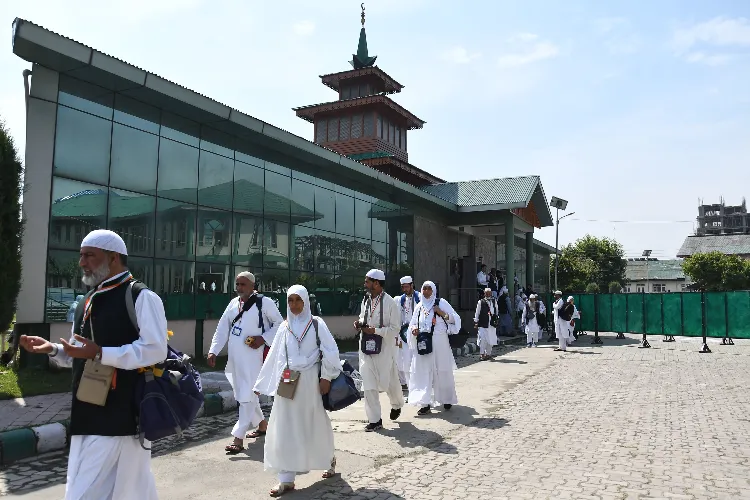
Sayyed Taleef Haider
Could Ijtihad be used to build bridges between Indian Muslims and other communities and help in minimizing conflicts?
Ijtihad, an Arabic word meaning ‘effort’ (to enlarge the Islamic laws) but, apart from the literal meaning, as a term it has a wider sense. According to the Islamic jurisprudence, Ijtihad is a supplementary clause of Adilla-e-Arba.
When it is not possible to use the Qur'an and Hadith in finding a solution to a problem, then Ijma (advice of the learned counsel) and Qaiyas (interpretation as per Islamic references) have to be used for Ijtihad, which could be simply described as reapplication of Islamic philosophy to find solutions to the problems of our day.
The Qur'an is a book of guidance but there is no direct reference to some of the contemporary issues of the Muslim community, likewise in Hadith.
Ijtihad is much required in India because Indian Muslims face issues which are very different from the rest of the Muslim world. Such a situation requires a type of ijtihadi mind that will bridge the gap between Hindus and Muslims.
Islamic rituals and practices of devotion must incorporate Ijtihadi philosophy, including the concept of using loudspeakers for Azan, Issue of Triple Talaq, offering Namaz in the plane, Issue of blasphemy, etc.
In India, one must take into account Ijtihadi directives to engage in healthy relationships with non-Muslims, respect their customs, and participate to better understand them.
However, Muslims in India lack an effective system of "Ijtihad." Indian Muslims no longer wish to explore any ijtihadi practices due to the widespread development of taqleed in India as a result of the simplistic approach, despite the country's dire need for ijtihad.
Taquleed means to follow the old ways and traditions is very common among Muslims in the Subcontinent, particularly in India. Ijtihad was started at the time of the Prophet and the incident of “Banu Quazayza” was the key argument of Ijtihad.
When the Prophet returned from the Battle of Ahzab he said: “No one should offer the Asr prayer anywhere except Banu Qurayza”, led by which the companions of Prophet [Sahaba] left for Banu Qurayzah but, some people were delayed due to some reasons and on the way, Asr time had come so someone said they would go to Banu Qurayzah (Jewish tribe) to offer the Asr prayer because this was the Holy Prophet’s orde. However, others said they would offer the prayer there because it was not the Holy Prophet’s intention to forgo prayer even when the time for it had come.
 Muslims in Srinagar boarding buses for their journey to Saudi Arabia for Haj
Muslims in Srinagar boarding buses for their journey to Saudi Arabia for Haj
Rather, the purpose of the Prophet was to try to pray among Banu Qurayzah. When this incident was mentioned before the Prophet, he did not reprimand anyone for it.
Similarly, there is a problem of Witr for Isha prayer Hazrat Ameer Mu'awiyah offered one raka'at of witr prayer to which a slave of Ibn-e Abbas objected. Ibn-e Abbas stopped him by saying:
“He is a Sahabi [companion of Prophet] so, don't interrupt. I am sure they will have a reason for this.”
These are the conditions of Ijtihad which appeared during Prophet Muhammad’s time. There should be no confusion on this point that the purpose of Ijtihad is not to make any changes in religion.
Rather, to find solutions to problems of our times in the Islamic perspective. With time, when Islam spread throughout the world, different forms of Ijtihad started to emerge. Consequently, the fundamental question of who could be the mujtahid (a person who practices Ijtihad) arose over time because not everyone has the ability to make any kind of changes in the Islamic rules.
Common people are not even aware of Bida’at-e Hasna and Bida’at-e Sa’ayyia so, Fuquaha (Islamic jurisprudence) made its rules. It is based on the Qura’anic word Oul-ul Amr, the people who are authentic and Ruler.
 A Kashmiri Muslim couple praying
A Kashmiri Muslim couple praying
The Quran’s Surah al-Nisa's says: “O believers! Obey Allah and obey the Messenger (blessings and peace be upon him) and those (men of truth) who hold command amongst you. Then if you disagree amongst yourselves over any issue, refer it to Allah and the Messenger ([blessings and peace be upon him] for final judgment), if you believe in Allah and the Last Day. That is best (for you) and best for the end result.”
Oul-ul Amr was interpreted by Fuquaha and Ulama from which the rules of Mujtahideen were compiled. There is a difference of opinion among different Ulama. For example, there is some disagreement among Imam Ghazali, Imam Baghwi, Imam Razi and Imam Sha’arani.
Regardless of this disagreement all agree that Mujtahideen must have authority on Adilla-e-Arba and the grip on the Arabic Language should be stronger. On the basis of these rules, types of Mujtahideen were created.
Abu Bakar Jassas [917-981] was the famous Faquih and Mufassir in the time of the Abbasia in Baghdad and he divided Mutahideen into two kinds, first was Mujtahid-e Mustaqil and second was Mujtahid-e Muntasib.
Apart from this, other types have been mentioned by different Ulamas, like Mujtahid Fil Mazhab and Mujtahid Fit Taquea. But these types seem redundant. Maulana Wahiduddin Khan has also written an insightful book on the issue of Ijtihad in the current era which is called Maslail-e-Ijtihad. In this book, he has already explained the difference between Ijtihad and Taquleed in the beginning. According to Maulana:
“In Taqulidi mind and Ijtihadi mind the difference can be simply explained as follows:
Taqlidi mind refers to a closed mind and Ijtihadi mind refers to an open mind. The thinking journey of a Taqulidi person stops when it reaches a limit, whereas the thinking journey of the Ijtihadi continues in the forward direction.”
Maulana has also given examples of what the Taqlidi and Ijtihadi mind is like. Of course, there is a need for many Ijtihadi minds in every era due to geographical, social, political, cultural and economic reasons. There are possibilities of new situations arising in the problems of Islamic Laws. But such Ijtihadi minds who are not aware of the basic rules of Ijtihad and try to create baseless ijtihad, leading to many misunderstandings. This affects the core message of Islam. In the 20th century, we faced many such problems created by the so-called Ulamas, in which Fatwaaz were given to prohibit the use of modern inventions from which people were harassed for a long time.
In such fatwa, the use of fans, toilet seats, paying visits at shrines, use of a tie, etc. were prohibited. There are many more issues of a similar nature. It is not easy to create a new opinion in religion. For this, we should act carefully in Kufr or Haram. This clause needs to be kept in mind in the Ijtihadi principle that until there is a deep knowledge of the current situation with ancient principles, no Ijtihadi decision of any kind can be made and Ijtihadi problems cannot be enlightened by ignoring the future possibilities.
ALSO READ: Why I believe SRK, AR Rahman, Naushad, Zakir Hussain could only be born in India
Islam has always permitted its laws and practices to be modified in accordance with the needs of the day. This not only makes it easier to practice Islam, but it also helps to convey the true message of Islam, which consists of peace. Also, ijtihad could help find solutions to the most pressing problems faced by Indian Muslims today.
